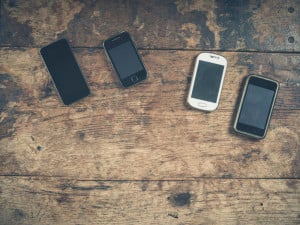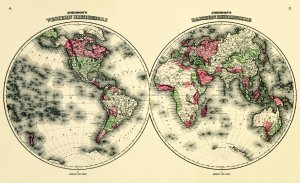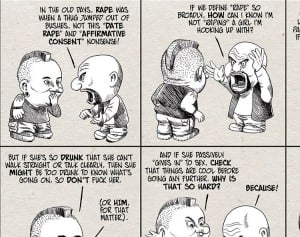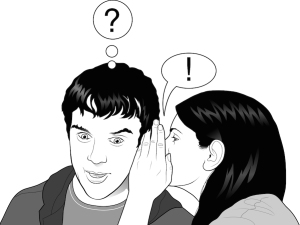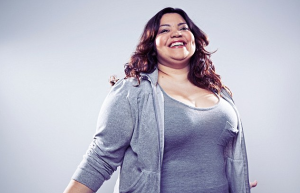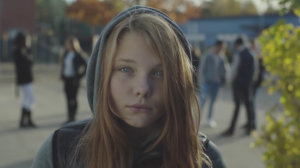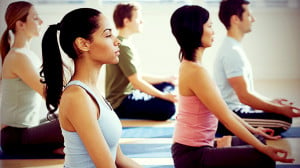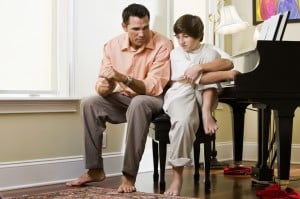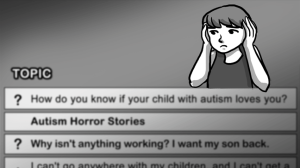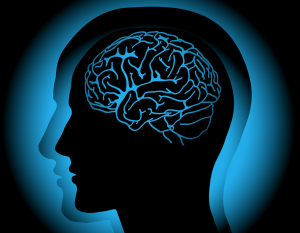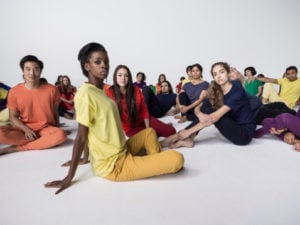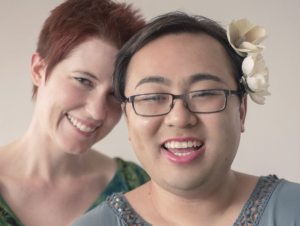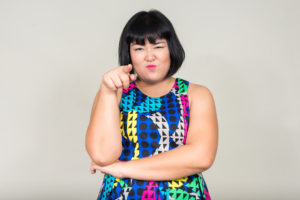
A person wearing a colorful dress points to the camera, scrunching their nose with a smirk on their face.
I’m a fat, fat-positive activist – and I don’t love my body.
I have spent the past several years thinking and speaking quite a bit about fatness. I’ve written about it both publicly and academically, participated in conferences, and co-wrote and performed in a play about fatness. I dress intentionally and strategically to show off my body and challenge presumptions of fatness in those around me.
And I’m sure that, for many people, these things leads them to believe that I do, in fact, love my body.
And while I do have a tremendous amount of self-love, that love is tied more to who I am than what body I exist in. So I do these things not because I have arrived at any enlightened plane of existence where I’ve successfully and completely worked through the ongoing trauma of living in a fat body, or living in my body is no longer hard, or because I have any answers. I do these because they are attempts at harm reduction and survival tactics to get me through the minefield of living at so many intersections that leaves me so cyclically sad, and lonely, and feeling helpless and hopeless.
I do these things in selfish attempts to help those around me work through our fat biases together, to hopefully make my life easier and, ultimately, more livable. It isn’t always successful, but it is nearly all I can think of to get through this world.
But it does sometimes feel like, because I am so visible and vocal about the particular struggles that come with existing as a fat person, there’s an assumption from those around me that this means that I have made it. I have arrived. I live in a utopia where I’ve worked through my body shame and internalizations of fatness and that I have all these answers.
And in some ways, this is true.
I’m in a much different place with my body than I was years ago, and likely different from where many others are, especially if they’re at the beginning of their journey.
There are things about my body that I used to feel shame around that I don’t anymore. There are things about my body I used to feel shame about, and still feel shame about, but have let go of trying to hide or minimize them. And there are things about my body that still feel me with not just shame, but anger, and frustration, and betrayal, and every feeling we’re expected not to feel about our bodies in order to be good feminists, activists, or fat people.
The particular size and shape of my body makes certain movements that come easy to other folks challenging or impossible. It can be difficult to find infrastructure that supports me, and I have to be constantly aware of the durability of chairs in any given room I’m in, or size of hallways and doorways. On top of this, surgeries as a child left me with a body that frequently aches and throbs, and a limp that no doubt contributes to these aches.
These are real experiences that consistently complicate my relationship to my body and make it a challenging one to love. But sometimes these feelings are heightened by the fear I’m letting down people who may see me as a sort of role model.
And this feels like the residue of a “Love Your Body” movement that can place unnecessary pressure on us to arrive to a destination of wholehearted and uncomplicated body acceptance.
It can be overwhelming and exhausting to attempt to make strides in our relationships to our bodies, and succeed in those strides, but still feel as if we’re not doing enough because we are not yet at a destination that is imagined as a concrete arrival but whose journey is much more abstract.
This is where this rhetoric can fail us and ignore the successes we have already accomplished.
And because there are so many ways to have a body, many of these are lessons I have learned that have come out of fatness – which is very different from undergoing this process while experiencing gender dysphoria and disability, and especially all of three embodiments at once.
So while I won’t claim to have all (or even any) answers, here are some things I have learned about the ways that “Love Your Body” rhetoric has failed me on my own journey of simply not hating my body.
1. It Ignores That We’re in the Midst of It
At an event I participated in last month with fat activist Virgie Tovar, she so poignantly articulated something I had been trying to express myself. In response to a question about how to deal with fat discrimination, she reminded an audience member that, usually when people are working through and healing from trauma, they are removed from the situation. But as fat people, we are constantly re-exposed to the trauma in daily interactions.
It was reminiscent of something another friend reminded me of years ago: that we are expected to undo years, if not decades, of trauma so quickly, while still being exposed to it.
I began my journey of fat positivity almost a decade ago, which is quite a length of time – and still, since I was in my early 20s, it is less than half of the time I had experienced internalization of the fat hatred that continues to surround me to this day.
The supposed ease of the “Love Your Body” mentality forgets that we are in a constant process and interaction with the world. We are having daily interactions that can have more power over us than we want them to, and having visceral reactions to them doesn’t make us weak or failures.
It’s understandable for seemingly small infractions to set us back. It is simply unreasonable and unfair to expect us to be bigger and stronger than systems that have existed long before us.
What we can do, instead, is let go of the pressure to love our body. Instead, we can attempt to meet our bodies halfway and make peace with them.
Letting go of what I wanted my body to look like or wished it did (undoubtedly informed by racist, ablest, fat hating, and cissexist notions of manhood and masculinity) allowed me to see my body for what it is and begin the journey.
Make space to forgive yourself for the ways in which you are unforgiving to your body – and remember how and why you were taught to feel this way.
2. It Obscures the Root Causes of Our Hateful Feelings
As I said before, there still are times when I still get frustrated or sad about my body. Sometimes it’s a minute, an hour, or a day – and sometimes it’s days, weeks, or months.
Last year, when I graduated college and received the proofs of my ceremony, I was so struck by seeing my body. It looked so much different than what I had imagined in my head, and I was sad and horrified. On top of that, I was ashamed that I felt sad and horrified.
While working through my feelings, I began to ask myself: What is so sad and horrifying about this body? And I began to realize: It wasn’t actually anything about my body. It was about the baggage that living in this body comes with. It was about the discrimination, the stares, the lack of access to jobs, romance, and sex that is facilitated not by my body, but by other people’s experiences of my body.
It was such a framework shift to understand that these painful, and material consequences were not inherent to my body or a fat experience, but the result of how those around me – including, to some extent, myself – had internalized negative understandings of my body.
And while these understandings continue to have very real on my quality of life, they are not inherent to a fat experience. And that means two things. The first: that they can be challenged, disrupted, and changed. And secondly, that they are not my body’s fault.
This helps me both identify the issues that stand between me and an unconditional love for my body, and distance the pain of living in my body from its inherent worth by remembering that neither my body nor I are responsible for this.
3. It Forgets That This Isn’t Always Work We Can Do Alone
This is perhaps the scariest lesson to come to terms with, for many reasons.
Acknowledging that healing is a cooperative experience is so important, but it can also feel like giving our power up. It reminds us that we are not always in control, that sometimes these things are out of our hands and, consequently, may never come. And that’s so hard. And so sad.
A major contributing factor to my contentious relationship to my body is feeling a lack of sexual attractiveness. I came to my sexual awakening in the midst of very common and traditional communities of thin gay men who were exclusively attracted to other thin men. I had few sexual prospects – and even rarer opportunities for sex.
It took me a long time to find a space where people thought I was attractive and to access the sexual lives it felt like my peers had been having all along. And this access continues to feel much more infrequent and laborious than what I witness my thin friends experiencing.
Still, the experiences of allowing myself to be vulnerable and other people to be intimate with my body has been incredibly healing and illuminating in being able to see my body in new, different, and less contemptuous ways. Finding my own beauty through others’ has been an instrumental part of my self-love.
And I recognize that this is can be an unsustainable and ultimately insufficient method. While there are people who say they love and appreciate and want to sleep with my body, there is still not someone who has treated my body in a way that has led me to believe it’s worthy of being loved, or even possible to be loved.
But this process has still opened up this possibility for me in ways that I was previously unable to see, and allowed me to connect with my body as not only desirable, but desired in ways that had I had not been able to.
I don’t believe that this is work that necessarily has to come through sex – and it has not always successfully worked for me. But I do believe that the work of loving our selves and our bodies also requires the work of other people showing us that this is possible through loving us and our bodies.
It isn’t always work we can do alone, the way that “Love Your Body” rhetoric suggests.
4. It Erases That People Are Profiting Off Our Pain
Something that is helpful for me is to remember that hating my body is in the service of white supremacy and patriarchy.
Every single way in which I don’t love my body is because I am conditioned to compare it to racist, fat hating, ableist, misogynist, and cissexist ideations of what bodies are meant to look like.
These systems work in tandem with capitalism to create a billion-dollar industry of weight loss products including gym memberships, apparel, diet books, and diet supplements that won’t work.
Under capitalism, we are groomed to be unhappy with our selves – and especially our bodies – to foster anxieties of inadequacy and a lack of fulfillment, producing cycles of our attempting to fill socially constructed voids with products. Products that people who are already wealthy just get wealthier from.
And, quite simply, I refuse. I refuse to reify, promote, participate in, and support the same systems that are killing me and so many others like me. I refuse to make it easier for them.
Loving our bodies is undoubtedly the ultimate resistance to this predatory and targeted assassination of our inherent worth and self-confidence, and it would be wonderful to seamlessly achieve the type of uncritical self-love that “Love Your Body” rhetoric asks of us.
And while, for many, this information alone might be enough to get them over the hump into truly loving their body (and that’s great!), it isn’t always for me.
But it does encourage me to stop hating my body, which is sometimes all that I can do. And a refusal to take responsibility for effects of systems that are not only much, much bigger than me, but target me and many like me is a start.
***
A binary that implies that not loving our bodies means we hate them is a false one.
While there are certainly moments where I love my body, there are also moments where I hate my body, and the moments where I feel neutral toward my body far outweigh either of these.
I have done a lot of work to make peace with and accept my body, and working to maintain that peace that is constant. These are some steps that help me through it.
They get easier with practice. I promise.
[do_widget id=’text-101′]
Caleb Luna is a working class fat, brown, queer, living, writing, performing and dancing in Oakland, California. They are a first-year PhD student at University of California, Berkeley, and their work explores the intersections of fatness, desire, fetishism, white supremacy, and colonialism from a queer of color lens. You can find more of their writing on Black Girl Dangerous and on Facebook and Tumblr under queerandpresentdanger.
Search our 3000+ articles!
Read our articles about:
Our online racial justice training
Used by hundreds of universities, non-profits, and businesses.
Click to learn more





